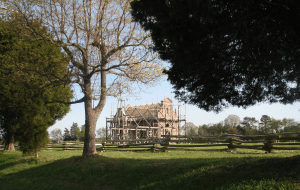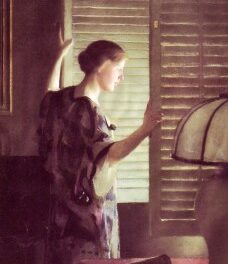We support our Publishers and Content Creators. You can view this story on their website by CLICKING HERE.
When I read Maurice Baring, I feel that, culturally, he is walking on a crystal floor above my head. He is so well read in so many different languages and so well-versed in the full panoramic landscape of Western literature, that I am in awe at the depth and the breadth of cultural experience from which he draws deep draughts of brilliance. Reading him takes hard work but in Baring’s case it is most certainly true to say that the gain outweighs the pain.
An Interview with Joseph Pearce
This year marks the centenary of the publication of the first novel by Maurice Baring, a bestselling novelist during the period between the two world wars, who was a great friend of both G. K. Chesterton and Hilaire Belloc. In the famous painting A Conversation Piece by Sir James Gunn in London’s National Portrait Gallery, Maurice Baring and Hilaire Belloc are shown standing behind a seated Chesterton. With his customary whimsical wit, Chesterton named the painting “Baring, Over-Bearing and Beyond Bearing”. Although neglected today, Maurice Baring’s novels were greatly respected and very popular internationally in his own day, being translated into French, Spanish and Portuguese. The following interview was given by Joseph Pearce to Gilmar Siqueira for the Spanish online journal, Marchando Religión. This is its first publication in English.
Who was Maurice Baring? How would you introduce him to people who have never heard anything about him? “Have you anything to declare” about him?
I like your wordplay on the title of one of Baring’s books, Have You Anything to Declare? First, I would declare unabashedly that Maurice Baring is one of my favourite authors. I love his novels and his poetry, though I’ve never had the opportunity to engage with his plays, a sin of omission that I hope to rectify one day. A contemporary and great friend of both Belloc and Chesterton, Baring was born in 1874, the same year as Chesterton, and died in 1945 from the debilitating effects of Parkinson’s Disease. All his novels, on which his reputation chiefly rests, were published between the two world wars. In my judgment, he is greatly underrated and deserves to be much better known, though in his own day his works were greatly admired.
Saint John Henry Newman said, in his Idea of a University, that “Catholic Literature… includes all subjects of literature whatever, treated as a Catholic would treat them, and as he only can treat them”. Baring published his first novel – Passing By (1921) – eleven years after his reception into the Catholic Church and as a mature man. In this first novel, as in the following ones, it seems to me that three big themes emerge: love, sin and sacrifice. Do you agree with that? What role does sacrifice play in Baring’s novels?
I would most certainly agree that love, sin and sacrifice are the predominant themes in his novels, though I might refine and distil those three themes into just two. His novels are about love and the consequences of its absence. From a Catholic perspective, love is not an emotion or a feeling but a rational choice to lay down one’s life for the beloved, even if the beloved is also the enemy. We are commanded to love our neighbour and our enemy, irrespective of whether we like them or have other emotional responses to them. Love is, therefore, inseparable from self-sacrifice. The absence of self-sacrifice is the absence of love. The axiomatic truth at the heart of all human life and all human love is that we sacrifice ourselves for others or else we sacrifice others to the self. This moral dynamic is the driving force of Maurice Baring’s novels.
His first novel translated into Portuguese was Daphne Adeane. In preparation for this interview, I reread the preface of the Brazilian translator Oscar Mendes. It was so beautiful! He writes that the translation of Baring was one of his greatest dreams coming true; and he also made some thoughtful observations:
His [Baring’s] characters did not practice exceptional deeds, at least not externally. We could even say that Baring monotonizes the movements of his creatures. We always find them around a dinner table, in a cottage, wandering in a garden, visiting an exposition, drinking tea. However, inside of this habitual monotony, and the quotidian, they live their dramas, their hearts break, sacrifices are consummated, treasons and cowardice are forged, the web of destiny is weft. Over that apparent tranquility and sameness of day-to-day hangs the dark cloud of destiny.
Here Oscar Mendes perceived a great characteristic of Baring’s novels, I think: the dramas are situated in quotidian life, precisely as such drama happens with all of us. How does Baring, as a Catholic novelist, treat artistically the quotidian life? Is there divine grace in the “monotone movements” of his characters?
Yes indeed. This aspect of Baring’s approach as a novelist was encapsulated by the great French novelist François Mauriac. “What I admire most about Baring’s work,” Mauriac wrote, “is the sense he gives you of the penetration of grace.” This is discovered in the mundane events of everyday life, in the little and almost unnoticed sacrifices of the characters and the manner in which they embrace the suffering that life brings. A character, a priest, in Baring’s final novel, Darby and Joan, explains that the acceptance of sorrow is the secret of life. When we understand this, he says, we will understand everything. The secret is not sorrow itself, or suffering, but its acceptance. It is in the acceptance of suffering, the taking up of the cross, that grace is present in Baring’s novels. From a Christian perspective this is also the way that grace becomes present in the real world. In this sense, we can see and say that Baring writes realistic fiction, rooted in realism as the mediaeval scholastic philosophers would understand it.
In Baring’s novels the characters talk about literature, music and theater. More than that, they really live the arts in their lives: for them, a song (I recall a particularly strong example of this in Passing By) or a poem become an integral part of their personal narratives. They aren’t snobbish, but authentically cultured. Is this a way in which Baring shows us how literature might be an important part of human life?
The power of art to change lives permeates the whole of Baring’s finest novel, C, which many people believe is his magnum opus. In this marvelous novel, the protagonist, who is known simply and enigmatically by the solitary initial, which gives the novel its title, is molded by his experience of the arts. The young protagonist is swept away by Romantic poetry and by the epic sweep of Wagner’s operas. The arts don’t merely influence him in some passive sense, they possess him. It is almost as though his identity is subsumed within the artistic reality of Romance and epic melodrama so that he no longer knows who he really is. The arts forge him and also make a forgery out of him, turning him into something counterfeit and less authentic than he is meant to be. It becomes a false god, an idol. There is in the protagonist’s experience something that reminds us of Dante, an intertextual dimension highlighted by the appearance of the aptly-named Beatrice, a character who offers an alternative vision of beauty. The novel is slow, the first part of it documenting C’s engagement with the arts, but the reader’s perseverance is rewarded as the conflict between aesthetic ideals and ethical truths runs its course.
In your interview with Jan Franczak, published by Catholic World Report, you’ve mentioned two great Catholic novelists who were influenced by Baring: Evelyn Waugh and François Mauriac. I can add a Brazilian one: José Geraldo Vieira, who even mentioned the name of Baring in some of his novels. One of his characters, Lúcia, was described by another character in the same novel as “a woman like these from Baring”. Like Baring’s, the novels of José Geraldo Vieira present literature itself as a vivid part of our lives, as a way to perceive – and express – our experiences more intensely. Do you think that Baring’s novels may help us to give some form to the experiences of love, sin and sacrifice in our own lives?
In our earlier discussion of the quotidian dimension of Baring’s work, we saw how his work presents the mundane in the light of grace or, putting it the other way round, how he shows the light of grace to be present in the mundane. The everyday scenarios in his novels offer a subtle reminder of Chesterton’s maxim that we don’t live in the best of all possible worlds but in the best of all impossible worlds. Baring shows us the presence of the miraculous in the everyday lives of apparently ordinary people, showing us thereby that there is no such thing as an ordinary person. We are all extraordinary manifestations of the image of God. In this way, we can see Baring’s work as subtly subversive of the materialism and pessimism of his age, and ours.
All of Baring’s novels were translated into Spanish. The edition of his novels that I have is in two volumes and was published in 1952. Angel Zuñiga, who wrote the preface for this edition, said that a Mass was celebrated for Baring in the Iglesia de Santa María del Mar, in Barcelona, after his death. As was the case in England and France, Maurice Baring’s novels were widely read in Spain and Brazil. Do you have any idea of why he has been almost forgotten, even in England? Why do you recommend a rediscovery of his work?
Part of the reason for the decline in Baring’s popularity can be seen in the general decline of cultural literacy. The coming peril was not bolshevism, said Chesterton, but standardization by a low standard. It is this dumbing down of culture to the lowest common denominator of crass banality which makes Baring unreadable to many in what Evelyn Waugh called our deplorable epoch. When I read Baring, I am always reminded of what Chesterton said of his friend, the saintly Dominican, Father Vincent McNabb. Chesterton said, speaking of Father McNabb’s sanctity, that he walked on a crystal floor above Chesterton’s head. When I read Maurice Baring, I feel that, culturally, he is walking on a crystal floor above my head. He is so well read in so many different languages and so well-versed in the full panoramic landscape of Western literature, that I am in awe at the depth and the breadth of cultural experience from which he draws deep draughts of brilliance. Reading him takes hard work but in Baring’s case it is most certainly true to say that the gain outweighs the pain.
This essay was first published here in July 2021.
The Imaginative Conservative applies the principle of appreciation to the discussion of culture and politics—we approach dialogue with magnanimity rather than with mere civility. Will you help us remain a refreshing oasis in the increasingly contentious arena of modern discourse? Please consider donating now.
The featured image is courtesy of Pixabay.

 Conservative
Conservative  Search
Search Trending
Trending Current News
Current News 






